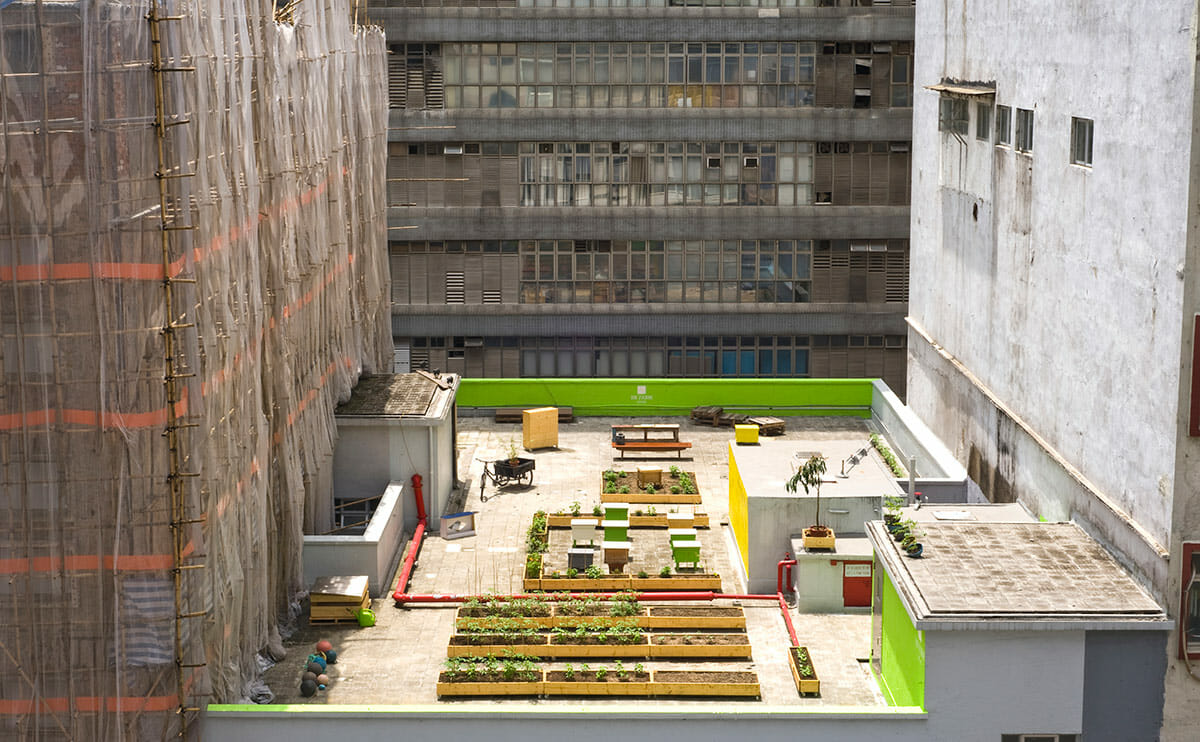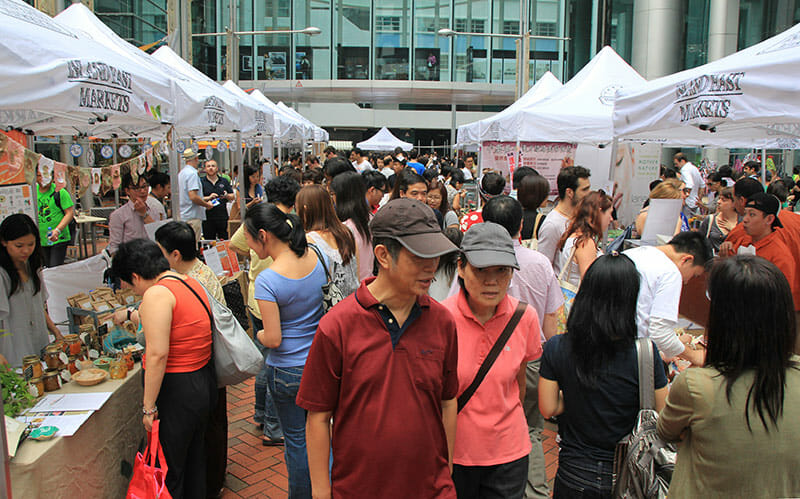Hong Kong Imports Over 90% of Its Food. Can It Learn to Grow?
In the course of 24 hours, the city consumes 931 tons of rice, 1,980 tons of vegetables, 34 tons of poultry, 4,270 pigs and 79 cows. Supermarkets, restaurants, cafes and street mar...
Hong Kong Imports Over 90% of Its Food. Can It Learn to Grow?
In the course of 24 hours, the city consumes 931 tons of rice, 1,980 tons of vegetables, 34 tons of poultry, 4,270 pigs and 79 cows. Supermarkets, restaurants, cafes and street mar...

In the course of 24 hours, the city consumes 931 tons of rice, 1,980 tons of vegetables, 34 tons of poultry, 4,270 pigs and 79 cows. Supermarkets, restaurants, cafes and street markets all form a complex but reliable food chain, feeding the hungry citizens of Hong Kong. Its restaurants are among the world’s best, and home to a growing array of celebrity chefs who are flocking to this urban epicenter. This Asian hub is a gastronomic center with an embarrassment of culinary riches.
Yet despite all that abundance, a disquieting truth lingers on.
In reality, Hong Kong is dangerously dependent on imports. Partly fueled by the city’s cosmopolitan tastes, partly fueled by its impressively capacious trading ports, over 90 percent of Hong Kong’s total food supply is imported. The nations that feed this city include the United States, Thailand, Brazil, the Philippines and Indonesia.
But for all the countries that import food into the city, none can compare to the city’s behemoth supplier: mainland China. Statistics indicate that 94 percent of Hong Kong’s fresh pork and 100 percent of fresh beef hail from the mainland. China also accounts for 92 percent of Hong Kong’s fresh vegetables and 97 percent of its live freshwater fish.
It’s a situation that makes some uneasy. Political and social tensions are increasingly high about China’s political hold on Hong Kong. So why are Hong Kong’s citizens so willing to rely on China for their food? Do they simply accept where their food comes from, or are they largely oblivious to this reality?
The simple answer is price. With its spacious fields and affordable labor, China delivers food at the large scale and low cost that the city needs. And geographical proximity also means that transport and logistical costs are kept to a minimum.
This is happening at a time when the food’s price is becoming increasingly important. As the cost of living in Hong Kong has shot up, its poorest citizens are forced to spend more and more to make ends meet, with the cost of basic staples such as rice doubling since 2007.
However, the belief that China will remain as the cheap alternative is slowly eroding away. Rising food prices and the rapid devaluation of the Hong Kong dollar mean that the reality of affordable food is quickly slipping away. At a time when the city needs to confront the reality of what is happening and find long-term solutions, an alarming lethargy still exists.

“Hongkongers spend too much time in malls and offices,” says Janice Leung, founder of Hong Kong’s largest farmers market, Island East Markets. “We want to get them outdoors and fostering relationships with the people who make and sell their food and other needs.” Lack of education and awareness, combined with a belief that agricultural work is “dirty” are cultural and social roadblocks, creating a city disengaged with the origins of its food.
No wonder then, that Island East Markets focuses on instilling the importance of homegrown foods and sustainable living. Featuring local produce made through sustainable agriculture, what was Leung’s gut instinct and interest in local produce has bloomed into a new communal tradition. Their most recent Sunday gathering hosted over 6,000 visitors. Slowly but surely, locals are warming up to the idea of truly local produce.
In a densely packed and crowded environment like Hong Kong, the city is also finding new and innovative solutions to farming. Rooftop farmer and urban beekeeper Michael Leung is a leading ambassador of local fare. Along with his coworkers, Matthew Edmondson and Glenn Eugen Ellingsen, the trio encourage the use of oft-ignored rooftop estate as prime places for farming. They sell their own produce, and run introductory workshops in rooftop farming, beekeeping and planter making. Leung himself has worked on New York’s preeminent rooftop farm, Brooklyn Grange, transplanting ideas from his time there and translating them to the local Hong Kong environment.
The concept of both local agriculture and urban farming is growing and slowly entering into the mainstream consciousness of the locals. That said, both concepts are still considered a novelty. “It’s still very much in its infancy in Hong Kong,” Leung admits. “There’s people growing food in the city for a very long time, but in terms of really communicating it as an urban agriculture project or a rooftop farm — and not as a garden concept — I think there’s only a handful of people actually doing that.”
While Hong Kong celebrates itself as a food mecca, the connection to its agricultural roots has become thin. For this small band of urban farmers, the hope is that citizens and future children will once again know how food is produced: with grimy hands and a lot of care.
Follow us

This work is licensed under a Creative Commons Attribution-NoDerivatives 4.0 International License.
Want to republish a Modern Farmer story?
We are happy for Modern Farmer stories to be shared, and encourage you to republish our articles for your audience. When doing so, we ask that you follow these guidelines:
Please credit us and our writers
For the author byline, please use “Author Name, Modern Farmer.” At the top of our stories, if on the web, please include this text and link: “This story was originally published by Modern Farmer.”
Please make sure to include a link back to either our home page or the article URL.
At the bottom of the story, please include the following text:
“Modern Farmer is a nonprofit initiative dedicated to raising awareness and catalyzing action at the intersection of food, agriculture, and society. Read more at <link>Modern Farmer</link>.”
Use our widget
We’d like to be able to track our stories, so we ask that if you republish our content, you do so using our widget (located on the left hand side of the article). The HTML code has a built-in tracker that tells us the data and domain where the story was published, as well as view counts.
Check the image requirements
It’s your responsibility to confirm you're licensed to republish images in our articles. Some images, such as those from commercial providers, don't allow their images to be republished without permission or payment. Copyright terms are generally listed in the image caption and attribution. You are welcome to omit our images or substitute with your own. Charts and interactive graphics follow the same rules.
Don’t change too much. Or, ask us first.
Articles must be republished in their entirety. It’s okay to change references to time (“today” to “yesterday”) or location (“Iowa City, IA” to “here”). But please keep everything else the same.
If you feel strongly that a more material edit needs to be made, get in touch with us at [email protected]. We’re happy to discuss it with the original author, but we must have prior approval for changes before publication.
Special cases
Extracts. You may run the first few lines or paragraphs of the article and then say: “Read the full article at Modern Farmer” with a link back to the original article.
Quotes. You may quote authors provided you include a link back to the article URL.
Translations. These require writer approval. To inquire about translation of a Modern Farmer article, contact us at [email protected]
Signed consent / copyright release forms. These are not required, provided you are following these guidelines.
Print. Articles can be republished in print under these same rules, with the exception that you do not need to include the links.
Tag us
When sharing the story on social media, please tag us using the following: - Twitter (@ModFarm) - Facebook (@ModernFarmerMedia) - Instagram (@modfarm)
Use our content respectfully
Modern Farmer is a nonprofit and as such we share our content for free and in good faith in order to reach new audiences. Respectfully,
No selling ads against our stories. It’s okay to put our stories on pages with ads.
Don’t republish our material wholesale, or automatically; you need to select stories to be republished individually.
You have no rights to sell, license, syndicate, or otherwise represent yourself as the authorized owner of our material to any third parties. This means that you cannot actively publish or submit our work for syndication to third party platforms or apps like Apple News or Google News. We understand that publishers cannot fully control when certain third parties automatically summarize or crawl content from publishers’ own sites.
Keep in touch
We want to hear from you if you love Modern Farmer content, have a collaboration idea, or anything else to share. As a nonprofit outlet, we work in service of our community and are always open to comments, feedback, and ideas. Contact us at [email protected].by Daniel Kong, Modern Farmer
August 8, 2013
Modern Farmer Weekly
Solutions Hub
Innovations, ideas and inspiration. Actionable solutions for a resilient food system.
ExploreExplore other topics
Share With Us
We want to hear from Modern Farmer readers who have thoughtful commentary, actionable solutions, or helpful ideas to share.
SubmitNecessary cookies are absolutely essential for the website to function properly. This category only includes cookies that ensures basic functionalities and security features of the website. These cookies do not store any personal information.
Any cookies that may not be particularly necessary for the website to function and are used specifically to collect user personal data via analytics, ads, other embedded contents are termed as non-necessary cookies.